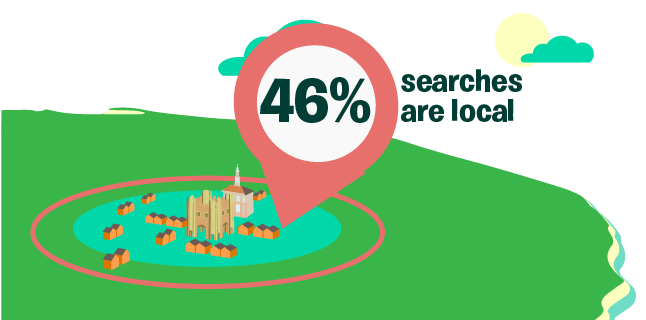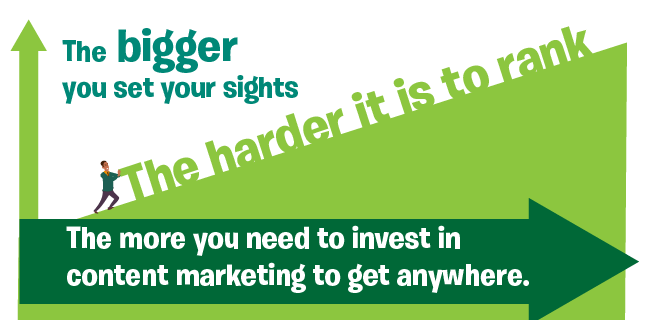SEO and content marketing. There can be a lot of confusion over these terms and how they link together.
But here’s the thing.
They do go hand-in-hand and should never be separated.
In today’s world, you need to focus on having both great content and good SEO practices to be successful online.
Gone are the days where you could simply update your website with a few relevant keywords with on-page SEO to rank well. These days are long gone.
In fact, with over 2 million blog posts alone being published each day, marketing is getting harder for businesses, as more websites pump out content that’s targeting keywords that may be relevant to you.
In addition to this, Google is constantly updating its algorithms – between a whopping 500 to 600 times a year – to ensure only the most relevant content appears in people’s search engine results pages (SERPs), which, by default, makes it harder for newcomers to rank easily.
In recent years, Google have also moved towards reducing the organic listing space on their site, prioritising more space for Search Engine Marketing (SEM) ads, so they can increase their revenues by allowing more paid advertisements.
Put all this together and you quickly realise that to get ahead of the competition, you don’t just need SEO optimisation, but a partnership between SEO and content marketing which is built on solid marketing foundations: consistent and built for the long-term.
But people always say on-page SEO is a priority?
Yes, they do.
But let me take you through a quick history lesson.
Every marketing consultant you’ll speak to will talk about optimising content, with keywords being one of the most important ranking factors. And this is completely true.
But here is the thing, a lot of these marketers had plenty of success back when SEO was all about dropping keywords onto a page in order to get to page one. Yes, it really was easy as that.
However, some people took advantage of this strategy and would try to deceive search engines. For example, spamming a webpage with lots of keywords, then changing the text and website background colour to match. Google would read these keywords and rank it highly for the number of instances, but a website user would land on a webpage that has no relevance or information to their search query.
And so, these days Google has become a lot more complex – focusing on quality and user experience, rather than just relying on keyword instances. They want you to write content for humans and will punish you if you don’t.
Therefore, when you speak to these markets about the successes they had back in the day, you need to be mindful of the time that they were having their success. Their strategy is completely relative to back when there was less competition and less complex algorithms. It was easier.
And following the same strategy today simply doesn’t work. The landscape is too complex; competition is rife, and Google is more advanced than it’s ever been.
That means, anyone who talks about SEO now is really just talking about creating engaging content and trying to get other websites to backlink to that content, rather than simply optimising the content itself.
Of course, your content still needs to be optimised and relevant for SEO, but Google is now depending rankings less on this as a key factor for how you rank, and more on how your webpage addresses a user’s search query. In other words, Google is trying to understand the intent of the content and the website it sits on.
Go onto Google yourself and enter the keyword ‘DIY store.’ Look who ranks organically for top positions. Do they look familiar?
Most of those businesses that rank highly generate tonnes of content.
Google actively encourages that behaviour and tends to rank those that create more than those who don’t.
This means that as a new business growing online, you need to completely dedicate a major part of your marketing strategy to creating loads of focused content to compete with those already one page one.
If you don’t, you will simply be overtaken by those who do decide to take this route.

Doesn’t this mean that SEO is becoming less accessible for businesses?
In short, yes.
It is harder for any business to just dip their toes into content marketing. Just doing on-page SEO on a few blogs is the equivalent of just doing.
If you only have capacity to put out one blog post, optimised with on-page SEO per month, then there is an argument that you may as well not bother. There may be other routes which may have a better return of investment, especially in the short term.
But, if you are serious about getting to that number one spot, then you can build a content marketing strategy that will steadily help you to rise up through the ranks.
Though, you will need to build a strategy which looks at more than just blogging.

You will have to actively promote your content and work out a way to use content marketing to build your overall strategy; such as implementing email marketing and using social media (paid and unpaid).
In other words, you need to throw yourself into the world of content marketing to fully to help your business gain some traction online. Doing it half-heartedly isn’t going to cut it.
Does that mean I shouldn’t bother with SEO?
No, it doesn’t.
But don’t underestimate the amount of effort required to make it a success, especially if you’re trying to rank for some of the most competitive keywords. Your content marketing plan needs to examine all possible routes to make it to the top, by finding new opportunities to rank for more specific keywords and long tail terms.
If you can rank for these, then you will increase your overall rankings, giving you even more opportunities to fight the big shots at the top.
Always remember that David did beat Goliath, but only because he had a focused shot to get there.

But, if there was to be a straight up content war, then Goliath, with all his content and backlinks behind him, would crush David.
And the same is true with your approach to content. You need to take a focused angle in order to win.
The good news is that there are plenty of other SEO and content strategies you can implement to help you to increase your rankings.
As an example, local SEO optimisation is a great way to reach the people in your local area that are interested in your products or services. And it’s certainly very popular too, as 46% of all current searches are local.

Let’s say you own a dry-cleaning business in Kings Lynn. You may not need to do loads of marketing as your audience is very localised and will be quite specific with their searches.
A good start would be to claim your Google My Business page and fill it with all your business essentials such as opening hours and location. Then you may start to optimise your website by creating webpages that also include local SEO keywords such as ‘dry cleaners in Kings Lynn’ and ‘dry cleaning suits Kings Lynn.’
These long-tail keywords may have lower search volume, but will have a better return for you, as the people searching specifically for your site will probably be actively looking to purchase your services.
In this situation, optimising a page for particular keywords in your area is perfect, and may be enough to get you to where you want to go.
You may also have a market which doesn’t invest in much content marketing in your area. In this instance, a small investment could go a long way to get you to the top. For example, by hiring a content writer part time to increase your content, or by bidding on local keywords and using SEM to reach your audience.
However, as a general rule of thumb, you should always follow:
The bigger you set your sights > the harder it is to rank > the more you need to invest in content marketing to get anywhere.

And with any good content marketing plan, you should always start with a comprehensive competition analysis which will help you to understand where you want to get to, who you’re trying to compete with, and allow you to create a marketing strategy that plays to your strengths.
With anything in life, any plan that you create should be focused and realistic. Otherwise basic psychology suggests that you won’t stick to it.
Just think of any crazy diet you’ve ever tried. 5 days of eating cabbage soup may trim your waistline, but it’s not going to keep you healthy or feeling great on the long-term. And so why would you expect to churn out a few keyword-enriched blog posts and maintain good rankings
Good content marketing is like a relationship. You need to put in time and work at it every day to make it successful
On-page SEO: how much time should I put into it?
On-page SEO is important, but every blog, and most websites which have a blog, are already doing this, just as you are.
So, what makes your effort worth any more than your competition? What are you doing differently to make Google think that they should increase your online presence over the current high rankers?
If you can come to terms with this, then you have to accept that you cannot just optimise your on-page SEO to rank highly. In fact, even a website with poor on-page SEO but a great domain authority is going to far outstrip a website that solely has great on-page SEO.
You need to do more than optimise, and anyone who tells you that just just optimising a page alone isn’t going to take your marketing anywhere.
Instead, you need a focused, detailed strategy, that’s built from a comprehensive competition analysis and incorporates opportunity for SEO growth over the long-term.
Once you’ve come to accept all of this, then you’ll have a better understanding of how much time and energy you’ll need to dedicate to this, and what skills and team members you may need to get on-board to help you best succeed.
If you want an honest and practical discussion on how to create a content marketing strategy that can increase your rankings and drive real results for your business, get in contact today. I’d be happy have an obligation-free chat about how you can grow online.




